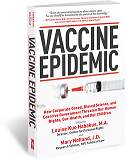
Health Impact News Comments: While the FDA recently issued a warning about mercury being an ingredient in certain cosmetics, it continues to approve mercury in the form of thimersosal as a preservative in vaccines. The Coalition for Mercury-Free Drugs had filed a petition to the FDA asking for mercury to be banned in 2007, and when the FDA refused, they filed a federal complaint. But a judge recently dismissed the complaint, stating that mercury-free versions of the vaccines were available, even though they cost more.
Mercury-Based Vaccine Preservative Lives On
By JACK BOUBOUSHIAN
Courthouse News Service
(CN) – The Food and Drug Administration is not liable for approving a mercury-based vaccine preservative because more expensive, mercury-free vaccines are available upon request, a federal judge ruled.
Thimerosal is a mercury-based compound that is FDA-approved as a vaccine preservative. Organizations such as the Coalition for Mercury-Free Drugs, however, have expressed concern about the preservative.
As a precautionary measure, most vaccines administered to children or pregnant women do not include thimersosal, but the flu vaccine is a significant exception. “Thimerosal-preserved flu vaccines are necessary to ensure sufficient supply at a reasonable price,” according to the judgment.
In August 2007, the coalition submitted a citizen petition to the FDA, asking the agency to ban the use of thimerosal in all vaccines for young children and pregnant women. When the FDA denied its petition, the coalition filed a federal complaint, alleging the FDA violated its duty to ensure the safety of vaccines.
A federal judge in Washington dismissed the complaint, finding that the coalition lacked standing to bring its claim.
Last week, the D.C. Circuit affirmed. “We recognize plaintiffs’ genuine concern about thimerosal-preserved vaccines,” Judge Brett Kavanaugh wrote for a three-judge panel. “But plaintiffs are not required to receive thimerosal-preserved vaccines; they can readily obtain thimerosal-free vaccines. They do not have standing to challenge FDA’s decision to allow other people to receive thimerosal-preserved vaccines.” (Emphasis in original.)
“Plaintiffs may, of course, advocate that the legislative and executive branches ban all thimerosal-preserved vaccines,” Kavanaugh added. “But because plaintiffs are suffering no cognizable injury as a result of FDA’s decision to allow thimerosal-preserved vaccines, their lawsuit is not a proper subject for the judiciary.”
“In light of plaintiffs’ avowed intention to refuse thimerosal-preserved vaccines, plaintiffs cannot show that they face a ‘certainly impending,’ or even likely, risk of future physical injury from thimerosal in vaccines,” the decision states.
“To be sure, plaintiffs point out that vaccination is often compulsory for children whose parents seek to enroll them in public schools. But thimerosal-free versions of required vaccines are available, as plaintiffs have conceded, so parents concerned about the effects of thimerosal can obtain thimerosal-free vaccines for their school-age children.”
Furthermore, “Even if vaccine providers generally charge a higher price for thimerosal-free vaccines, the mere existence of a price differential would not establish that thimerosal-free vaccines are not readily available at a reasonable price. The price might be higher for the simple reason that things packaged individually (like thimerosal-free vaccines, which are packaged in single doses) generally cost more than the same things packaged in bulk (like thimerosal-preserved vaccines, which are packaged in multi-dose vials),” Kavanaugh concluded.
Read the Full Story Here: http://www.courthousenews.com/2012/03/23/44979.htm
Vaccine Epidemic
How Corporate Greed, Biased Science, and Coercive Government Threaten Our Human Rights, Our Health, and Our Children
by Louise Kuo Habakus and Mary Holland J.D.
FREE Shipping Available!
More Info




